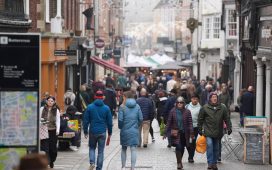London’s social housing residents are facing prejudice, discrimination and humiliation due to their housing status – with media portrayals in TV shows like Benefits Street to blame, according to a new report.
Laying bare the stigma faced by those living in social housing a group of the capital’s biggest housing associations found that almost half of residents, 45 per cent, have experienced prejudice or discrimination because of their housing status.
Meanwhile, more than a third of those surveyed by the group, called G15, described feelings of embarrassment.
The report blamed media portrayals in shows such as Channel 4’s Benefits Street, which it said shaped “misleading stereotypes” by showing them as criminals, unemployed or reliant on welfare.
The five-part documentary, aired in 2014, focused on a street in Winson Green in Birmingham where 90 per cent of people were said to be claiming benefits.

One resident who responded to the G15 survey said: “The media has a huge role in shaping people’s views. Programmes like Benefits Street made us feel judged and embarrassed. It’s not the reality of who we are.”
The group of housing associations said residents living in the 655,000 social rent homes across London formed “an essential part of the capital’s social and economic fabric”.
But ahead of the remaining stages of Labour’s renters’ rights bill being debated in parliament, its chairman Daisy Armstrong warned stigma around social housing “continues to hold us back”.
“Social housing is a lifeline for so many people… it’s time we focused on the reality: we are proud of our homes, proud of our communities, and proud of the contributions we make to society,” she said.

The report, seen by The Independent, found the most common source of stigma for social housing residents was in interactions with landlords. Other areas included conversations with banks and mobile phone companies as well as dealings with the police. One in five residents even reported a negative impact on their employment or career opportunities as a result of living in social housing, while 14 per cent said it had affected their dating lives.
G15 chairman and chief executive Fiona Fletcher-Smith said: “This report should be a wake-up call to society and policymakers. Social housing residents are the beating heart of London – not only as essential workers but as neighbours, carers, young professionals, families, and active members of their communities.
“We must challenge negative stereotypes, confront damaging rhetoric, and ensure that our residents are treated with respect and dignity.”

Labour’s manifesto promised to build 1.5m homes within its first five years in government, prioritising social rented homes and protecting the existing supply of social rented housing from being sold off.
And the renters’ rights bill, being pushed through by deputy PM Angela Rayner, will abolish Section 21 so-called no-fault evictions, under which tenants can be removed from rented housing when a fixed-term tenancy ends or during a rolling tenancy.
Last year alone, nearly 26,000 households faced homelessness as a result of a Section 21 eviction orders and were forced to turn to their local councils for support.
It will also give tenants the right to request a pet, with landlords unable to “unreasonably refuse” and able to request insurance to cover potential damage from pets if needed.
Other measures in the renters’ rights Bill include moves to strengthen tenants’ rights, with renters empowered to challenge unfair rent increases and plans to outlaw rental bidding wars by landlords and letting agents.
Under the Bill, Labour will also make it illegal for landlords to discriminate against tenants in receipt of benefits or with children when choosing to rent out their property.
The Ministry of Housing, Communities and Local Government has been contacted for comment.










